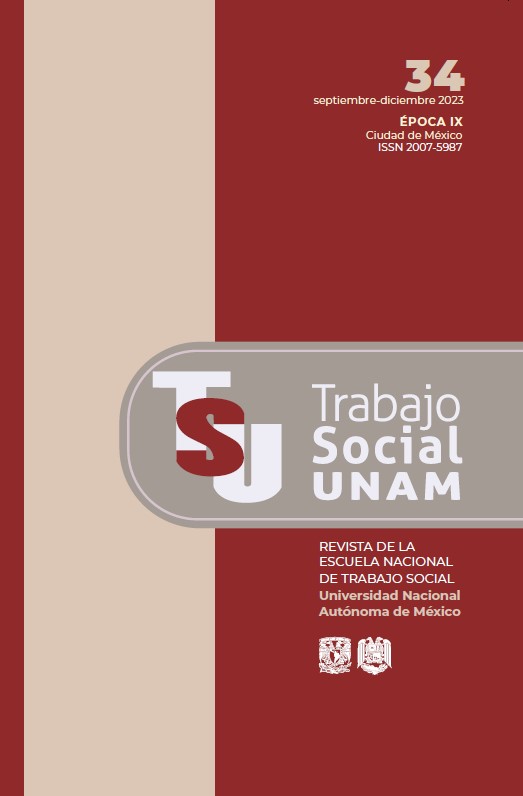De la actividad social a la transdisciplina: orientaciones conceptuales del trabajo social
Main Article Content
Abstract
This article aims to analyze the conceptual approaches that have been given to social work during its historical evolution, not as a definitive or finished proposal, but rather, as its name implies it says, as an approach that makes it possible to focus future discussions in the disciplinary field. The categories of analysis from which it started are social work seen as an activity, social technique, art, technology, praxis, profession, discipline, science and as a
transdiscipline. It is a documentary study, since libraries, databases and the Internet were used as information search scenarios for its preparation. The basic search criteria are expressed in books, articles and specialized documents. The developed procedure was established in four moments: search planning, information inquiry, source classification and report preparation.
The results obtained allow us to draw three conclusions: the first, which shows that social work has been defined from different meanings and positions; the second, establishes that social work in its contemporary conceptualization is a discipline of the social sciences in charge of generating theoretical, methodological, technical and instrumental knowledge of the social problems and needs that afflict the individual, groups, communities or regions; the third, which alludes to the notion of a profession that intervenes in the care of these problems through various government institutions, civil society organizations and business organizations.
Article Details
References
Alayón, N. (1981). Definiendo al trabajo social. Hvmanitas.
Alayón, N. (2014). Definiendo al trabajo social. 4ta edición. Lumen. http://biblioteca.clacso.edu.ar/ar/libros/historico/alayon.pdf
Anger-Egg, E. (1995). Diccionario del trabajo social. Lumen. https://abacoenred.com/wp-content/uploads/2017/05/Diccionario-de-trabajo-social-Ander-Egg-Ezequiel.pdf
Ander-Egg, E., Paraíso, V., Kruse H. y Chartier, R. (1969). El servicio social en América Latina: ensayos. Alfa.
Bautista, M., Sánchez, M., Zavala, A., Franco, M. y Brain, M. (2009). Informe del contexto del campo científico disciplinar. UNAM-ENTS.
Bautista, M. y Jiménez, V. (2019). Acercamientos interpretativos al perfil del trabajador social tanatológico. Revista Trabajo Social UNAM, (21-22), 43-58. http://www.revistas.unam.mx/index.php/ents/article/download/79549/70267
Casero, F. (2022). Actividad social. Obtenido de Hábitos saludables: https://habitossaludablesdevida.com/actividad-social/
Evagelista, E. (2011). Aproximaciones del trabajo social contemporáneo. ENTS-UNAM.
Gambau, V. (2018). ¿Qué es una profesión? [sitio web]. Consejo General de la Educación Física y Deportiva [COLEF]. https://www.consejo-colef.es/post/vgambau-profesion
Gianella. A. (2006). Las disciplinas científicas y sus relaciones. Anales de la educación común, 2(3), 74-83. http://www.paginaspersonales.unam.mx/files/1160/Asignaturas/98/Archivo2.158.pdf
Guevara, R. (2016). El estado del arte en la investigación: ¿análisis de los conocimientos acumulados o indagación por nuevos sentidos? Folios. Segunda época, (44), 165-179. http://www.scielo.org.co/pdf/folios/n44/n44a11.pdf
Montoya. G, Zapata. C y Cardona. B (2002). Diccionario especializado de trabajo social. Medellín: Ed. Universidad de Antioquía.
Oporto, V. (2006). Una introducción al trabajo social: elementos teóricos para un análisis crítico. CITS-BO.
Osorio, J. (2001). Fundamentos del análisis social: la realidad social y su conocimiento. Fondo de Cultura Económica. UAM.
Peiró. R. (2022). Ciencias Sociales. Economipedia [Blog]. https://economipedia.com/definiciones/ciencias-sociales.html
Prats, J. y Fernández, R. (2017). ¿Es posible una explicación objetiva sobre la realidad social? Reflexiones básicas e imprescindibles para investigadores noveles. Didacticae, 1, 97-110. https://revistes.ub.edu/index.php/didacticae/article/view/18083/20710
Wallerstein, E. (Coord.). (1996). Abrir las Ciencias Sociales. Informe de la Comisión Gulbenkian para la reestructuración de las ciencias sociales. Siglo XXI Editores.
